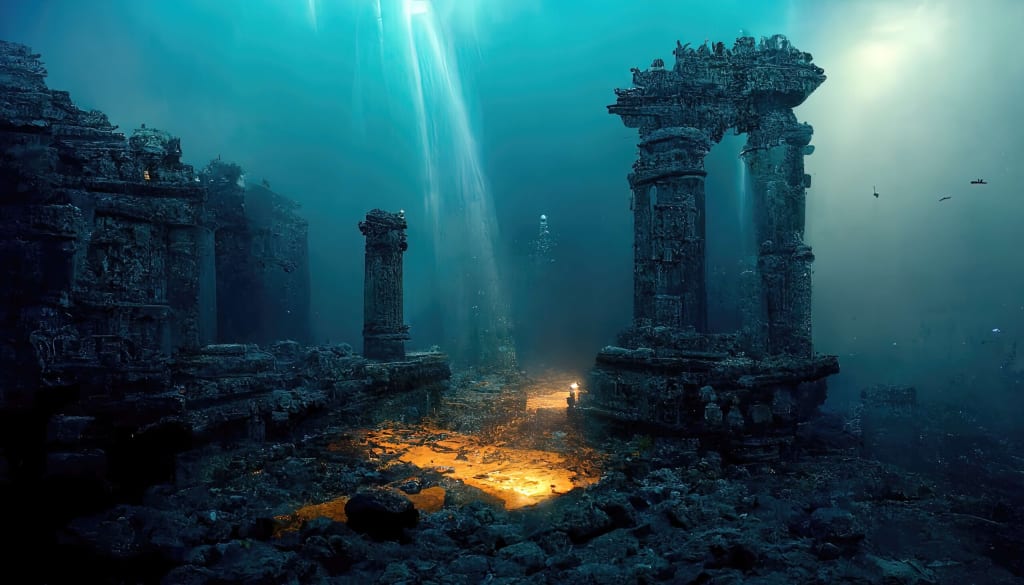L'atlantide: The Fabulous Island
The Enduring Mystery of a Lost Civilization

The legend of Atlantis, a lost island said to have sunk beneath the ocean, has captivated the imaginations of people for centuries. This fabled island, known as L’Atlantide in French, first appeared in the works of the ancient Greek philosopher Plato. His accounts of a powerful and advanced civilization, which met a tragic end, have inspired countless stories, theories, and explorations. Despite the lack of definitive evidence, the allure of Atlantis endures, symbolizing humanity's quest for knowledge and the mysteries of our past.
Plato's Tale
Plato introduced the story of Atlantis in two of his dialogues, "Timaeus" and "Critias," written around 360 BCE. According to Plato, Atlantis was a mighty and prosperous empire located beyond the "Pillars of Hercules" (now known as the Strait of Gibraltar). The island was described as larger than Libya and Asia Minor combined, boasting advanced architecture, sophisticated technology, and a utopian society.
Plato recounted that Atlantis was a formidable naval power that conquered many parts of Western Europe and Africa. However, its moral and spiritual decay led to its downfall. The gods, displeased with the Atlanteans' hubris and corruption, decided to punish them. In a single day and night of catastrophic earthquakes and floods, Atlantis sank into the ocean, disappearing without a trace.
The Search for Atlantis
The idea of a lost advanced civilization has fascinated scholars, adventurers, and mystics for centuries. Many have attempted to locate Atlantis, proposing various sites around the world, including the Mediterranean, the Caribbean, and even Antarctica. The lack of concrete evidence has not deterred these efforts; instead, it has fueled a wide array of theories and speculations.
One of the most popular theories suggests that Atlantis was situated on the island of Thera (modern-day Santorini), which experienced a massive volcanic eruption around 1600 BCE. This event caused significant destruction and is believed by some to align with Plato's description of Atlantis's catastrophic end. However, this theory, like many others, remains speculative and debated among scholars.
Cultural Impact
The legend of Atlantis has had a profound influence on literature, art, and popular culture. From ancient times to the modern day, the tale of the lost island has been reimagined and retold in countless forms.
During the Renaissance, interest in Atlantis was revived, with scholars and writers incorporating elements of the myth into their works. The idea of a lost, advanced civilization resonated with the era's spirit of exploration and discovery.
In the 19th and 20th centuries, Atlantis became a popular theme in fiction. Jules Verne's "Twenty Thousand Leagues Under the Sea" and Sir Arthur Conan Doyle's "The Maracot Deep" are notable examples of literature inspired by the Atlantis legend. The island also found a place in esoteric and mystical writings, with figures like Helena Blavatsky and Rudolf Steiner linking it to ancient wisdom and spiritual traditions.
Atlantis's allure has not diminished in contemporary times. The story has been adapted into movies, TV shows, and video games, often depicting a technologically advanced society that holds the key to lost knowledge or hidden treasures. The enduring fascination with Atlantis reflects our ongoing curiosity about ancient civilizations and the mysteries of our past.
Scientific Perspectives
While the legend of Atlantis remains largely in the realm of myth, some scientists and researchers have approached the story with a more analytical perspective. They explore geological, archaeological, and historical evidence to understand if there could be a factual basis behind the myth.
Geologists have studied ancient tectonic activity and sea-level changes to identify potential sites that might align with Plato's account. Archaeologists have examined ruins and artifacts from various ancient civilizations, seeking connections to the Atlantis legend. Historians analyze ancient texts and records, attempting to correlate historical events with the tale of Atlantis.
Despite these efforts, definitive evidence for the existence of Atlantis remains elusive. However, the scientific inquiry into the legend has contributed to a greater understanding of ancient civilizations and the natural world, demonstrating how myth and science can intersect in the pursuit of knowledge.
L’Atlantide, the fabulous island, continues to captivate the human imagination. Whether viewed as a cautionary tale, a symbol of lost knowledge, or an enduring mystery, the legend of Atlantis speaks to our fascination with the unknown and the eternal quest to uncover the truths of our past. As long as curiosity drives us to explore and question, the story of Atlantis will remain a powerful and compelling part of our cultural heritage.
About the Creator
Angelina Reen
Penning down my thoughts, stories, and lessons to inspire and bring joy. Join me on my journey of self-discovery!
Enjoyed the story? Support the Creator.
Subscribe for free to receive all their stories in your feed. You could also pledge your support or give them a one-off tip, letting them know you appreciate their work.






Comments
There are no comments for this story
Be the first to respond and start the conversation.